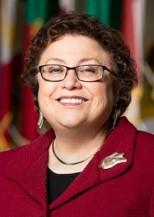I didn’t know any engineers growing up; in fact I had no idea what they did. But I loved solving puzzles–geometric proofs, science projects, finding chemical unknowns in the lab, calculus problems. My parents encouraged me in this… although I must admit that my mother (an English teacher extraordinaire!) was not entirely sold on it as offering much of future. Even when I was studying ceramic engineering at Georgia Tech, mom suggested that I joint enroll at Georgia State University and get a teaching dual degree because, after all, who would hire a woman engineer?But when I was in high school, mom went along with things like schlepping me all over the state of Georgia to collect water samples from various rivers so that I could test a theory about water pollution. In hindsight, it was a terrible experimental design, but we had fun in the process–the family used the opportunity to visit many interesting historic locations around the state like the Etowah Indian mounds. My brother and sister were equally inspired and encouraged to pursue their interests, and we all ended up in STEM-related careers. I was fortunate to encounter a couple of exceptional teachers who helped me see the possible. Chief among those were my high school calculus teacher, William King, who made learning a game and offered prizes for accomplishment that included some of his own artwork. To this day I treasure one of his abstract paintings. His confidence in my ability, coupled with his skill in making calculus tangible, helped me successfully navigate the transition to college. In my sophomore year, when I could not decide on a major, a friend introduced me to the Chair of the School of Ceramic Engineering, Joe Pentecost, who was known for his ability to help students assess their interests and skills. He singularly influenced my decision to study ceramic engineering (although in fairness, the fact that the curriculum did not require organic chemistry didn’t hurt.) “Dr. P” was a supporter throughout college and in the initial years of my career, always ready to listen, counsel, and cheer me on. When I was enrolled at Georgia Tech, the student body was less than 15% women. There were only three sororities on campus, none of which was able to house its members. There was one woman on the engineering faculty, and she graciously encouraged and mentored any woman student, regardless of the major. The Society of Women Engineers had a presence, but there were not many on campus support organizations or mentoring programs for women as there are today. I was fortunate to find a major that welcomed and encouraged women as students, but at the time there were still professors who openly expressed that women should not be engineers. Others may not have been as vocal, but yet may have demonstrated subtle and sometimes unintended biases that might push young women into other career choices. I was fortunate to find champions and mentors, from high school through college and in my early career, who saw the engineer first and the girl second, and helped their colleagues to do the same. Having worked many years as an engineer/program manager and having managed a manufacturing facility, I can attest to the fact that, thankfully, it’s a different world today. The young women I meet who are just starting out generally find my stories about college and the early years of my career interesting but not particularly relevant to their situation. Yet, for all the progress we have made, women are still underrepresented in many technical fields-fields that offer high paying and secure opportunities in careers critical to our society’s future. Those subtle biases are still at work. Professionally, I have long worked to increase the representation of women in science, technology and engineering, speaking and facilitating, serving on the advisory boards for both Georgia Tech’s College of Engineering and its Women in Engineering Program, founding a women’s affinity group for my business, supporting programs that familiarize girls with technology, bringing the Girl Scouts into our facilities for badge workshops, and serving on the board of the Georgia Youth Science and Technology Centers. So I was thrilled when just last month, my two worlds collided when WRJ voted to fund scholarships for girls (apply here) to attend the new URJ Six Points Sci-Tech Academy. As my own experience has taught me, it is so important for girls to feel safe and welcomed into male-dominated professions… and to see puzzle and problem solving not as insurmountable challenges but rather as opportunities. So, to me, these scholarships are consistent with WRJ’s tradition of standing up for women and girls, and I am very proud that we have chosen to lead in this manner. My mother ended up being my proudest supporter, and she is thrilled that her granddaughter (my niece) is an accomplished Science Olympian. I wish we’d had that when I was growing up! If every one of us encourages even one girl to think about science, engineering and math as fun, and supports her as she explores the possibilities, just imagine the difference we could make!
Related Posts

Continuing to Educate and Empower People Together

My Challah-Making Experience


